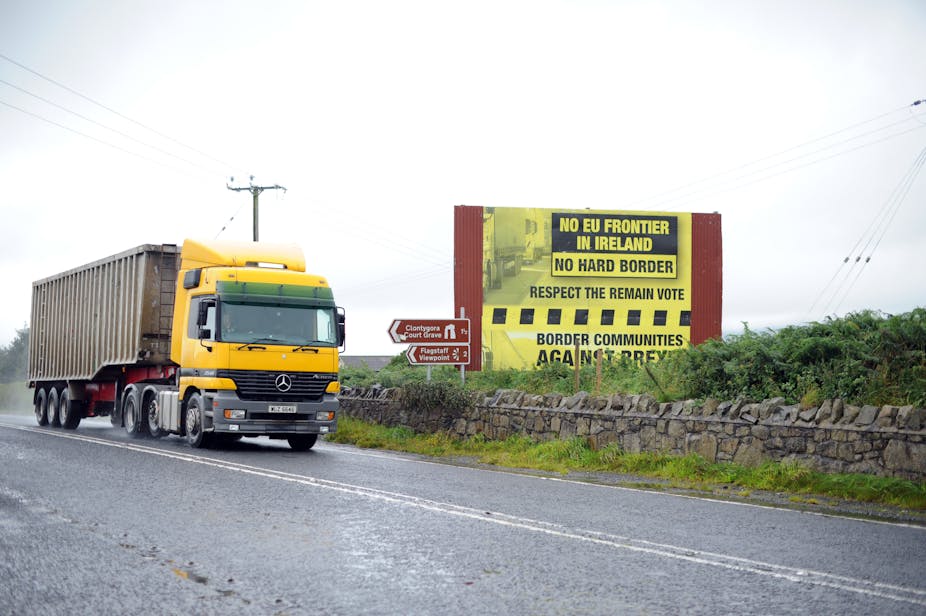When the Good Friday Agreement was reached in 1998, paving the way for a new era of peace and power-sharing in Northern Ireland, it took over a decade for it to have an impact on relationships along the border. Now, with the future of the Irish border at the centre of Brexit negotiations, a new reset of cross-border relations between Northern Ireland and the Republic of Ireland is on the cards.
In the 2000s, during research my colleagues and I carried out on the Irish border, we found that people on the southern side were still slow to talk about the north. They distanced themselves morally from it; seeing the border more as a division between the civil south and the violent north, rather than a territorial division. One Catholic woman described her experience to us:
When we grew up, there was a lot more freedom of everything and then when the trouble started and so many people came from the north to live here, people were afraid, afraid to say what they thought, what they felt, afraid to say anything and that has never gone away, that whole thing.
Another man, speaking of the northerners who came south, for refuge from the troubles told us: “They’d even take over the whole conversation. We were placid, quiet, but they were all gun[s] blazing.”
Opening up
When we repeated similar conversations ten years later in 2014, there had been a sea change on the southern side of the border. One young radical mother with feminist and republican sympathies told us: “People feel … less harsh, less entrenched, more willing to reach out the hand and see the other point of view.”
An older conservative Catholic man agreed with her:
What I’d say is [people are now] more tolerant of other people’s views. That, if I’m talking to somebody and they’ve got a different point of view to me, years ago I would have clammed up and said no more. Nowadays I’ll discuss it openly.
The south’s reputation for “clamming up” with respect to the north, the pushing away of discussion, had ended: a deliberative community was in the process of being formed. This new openness partly stretched across the border and mirrored the new ease of passage across it. It didn’t change people’s politics but opened up political disagreements to discussion and debate.
This was limited to the border region, and it involved north-south discussion and dialogue, with those of unionist as well as nationalist background. It didn’t include that minority section of unionists to the north who felt “besieged” either by nationalists or by the new post-Good Friday politics and who wanted nothing to do with Catholics or nationalists.
Today, most of the rest of the population in the Republic of Ireland, away from the border, are still not interested in the north. For most citizens there is no point in offending unionists or stirring up a hornet’s nest by airing disagreements. In effect, this has let the loudest loyalist voices prevail in the north over others who might have entered the conversation.

Brexit changes power relations
Both the progress in the border areas, and the Irish government’s inactivity with respect to the north, are now challenged by Brexit.
The UK’s departure from the EU threatens key institutional pillars of the Good Friday Agreement, including the north-south institutions set up under it. There is also uncertainty about the future of human rights protection and harmonisation between north and south after Brexit. It reverses the trajectory of open borders between north and south, so central to the agreement. After Brexit, the border will matter more not less to trade, travel, rights – and symbolically.
Brexit also changes power relations in Northern Ireland. As Westminster becomes more focused on protecting its sovereignty, this undercuts the British neutral position basic to the Good Friday Agreement. It encourages unionists to push back the settlement. This has already been seen in a range of policies since 2012, including resistance on funding for Irish language programmes, and u-turns on the Maze Heritage centre and Narrow Water Bridge. This push-back renewed the nationalist and republican vote at the June 2017 election, and indirectly led to a breakdown of power-sharing.
The alliance between the Democratic Unionist Party and Conservatives at Westminster only adds to the dangers.
The role of the Irish state
Brexit stands to increase the institutional and cultural divisions between north and south and make it impossible for the Irish government to uphold the principles of the Good Friday Agreement. This is a recipe for conflict. The broad nationalist and republican strategy since 1998 – pushing for an egalitarian and peaceful Northern Ireland with strong links to the south and a respect and recognition for each identity and tradition – could well be seen to be a failure, opening the way to dissident groups.
By that very same token it gives very strong incentive for the Irish state, fearing destabilisation, to intervene to balance the effects of Brexit and reconstitute north-south relations. So this dangerous geopolitical context has one positive aspect: a new phase of British-Irish constitutional restructuring will have to occur because it is a vital interest of the Irish state.
The Irish state’s long-term strategy of successfully balancing dependence on Britain, Europe and the US is ended with Brexit. A new direction is needed and the Irish state will become the prime agent in reconfiguring north-south relations to balance the effects of Brexit. Brexit has sparked a potential constitutional moment, where politics has to dominate over economics or party political rivalries within Ireland. This could be modelled on the progress in the border areas themselves.

